Reflective Essay: 2204NRS - Caring for Older Person with Dementia
VerifiedAdded on 2023/06/07
|8
|2251
|454
Essay
AI Summary
This reflective essay employs Gibbs' reflective cycle to analyze the experience of caring for an older person with dementia impairment during a clinical placement. The author describes the initial interaction with the patient, noting his confusion, memory loss, and previous negative experiences with healthcare providers. Feelings of sadness and a determination to build trust are explored, leading to the establishment of a therapeutic relationship. The essay evaluates the positive outcomes of this approach, including improved communication and the application of nonpharmacologic interventions like classroom memory training. The conclusion emphasizes the importance of therapeutic relationships in nursing care and identifies areas for personal improvement, such as communication skills. The action plan outlines strategies for future clinical practice, including a deeper understanding of disabilities and patient-centered decision-making. The goal is to provide more effective care through improved therapeutic relationships and appropriate treatment techniques.
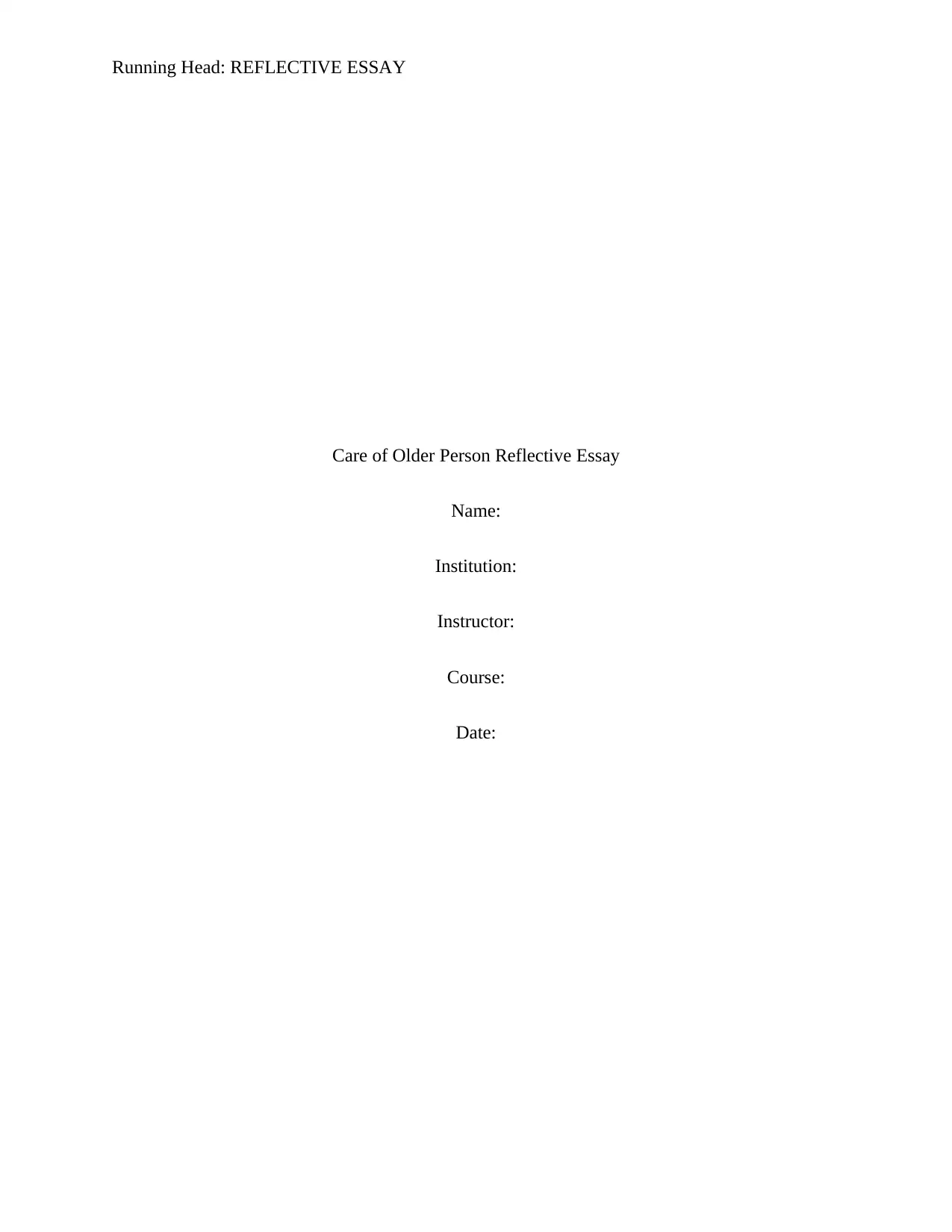
Running Head: REFLECTIVE ESSAY
Care of Older Person Reflective Essay
Name:
Institution:
Instructor:
Course:
Date:
Care of Older Person Reflective Essay
Name:
Institution:
Instructor:
Course:
Date:
Paraphrase This Document
Need a fresh take? Get an instant paraphrase of this document with our AI Paraphraser
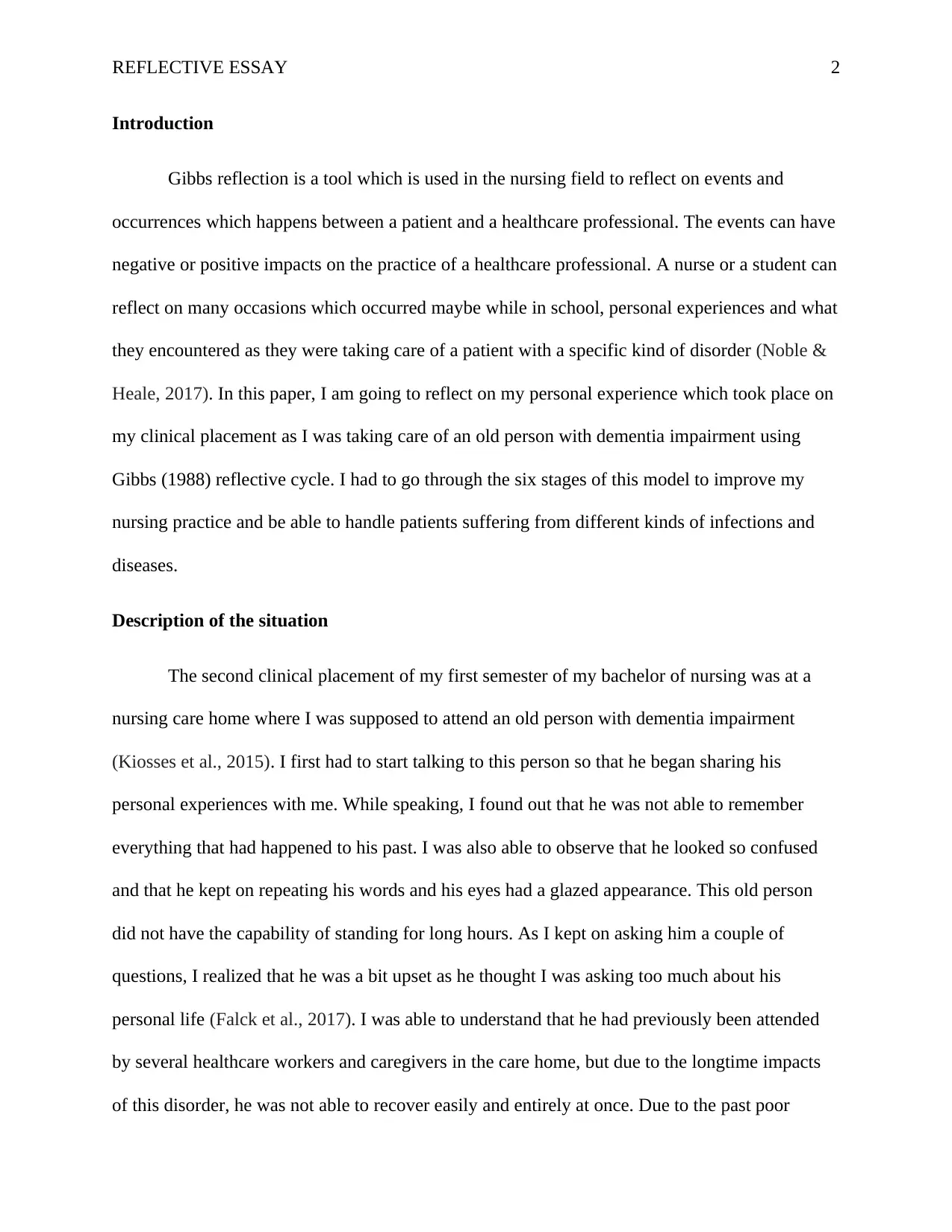
REFLECTIVE ESSAY 2
Introduction
Gibbs reflection is a tool which is used in the nursing field to reflect on events and
occurrences which happens between a patient and a healthcare professional. The events can have
negative or positive impacts on the practice of a healthcare professional. A nurse or a student can
reflect on many occasions which occurred maybe while in school, personal experiences and what
they encountered as they were taking care of a patient with a specific kind of disorder (Noble &
Heale, 2017). In this paper, I am going to reflect on my personal experience which took place on
my clinical placement as I was taking care of an old person with dementia impairment using
Gibbs (1988) reflective cycle. I had to go through the six stages of this model to improve my
nursing practice and be able to handle patients suffering from different kinds of infections and
diseases.
Description of the situation
The second clinical placement of my first semester of my bachelor of nursing was at a
nursing care home where I was supposed to attend an old person with dementia impairment
(Kiosses et al., 2015). I first had to start talking to this person so that he began sharing his
personal experiences with me. While speaking, I found out that he was not able to remember
everything that had happened to his past. I was also able to observe that he looked so confused
and that he kept on repeating his words and his eyes had a glazed appearance. This old person
did not have the capability of standing for long hours. As I kept on asking him a couple of
questions, I realized that he was a bit upset as he thought I was asking too much about his
personal life (Falck et al., 2017). I was able to understand that he had previously been attended
by several healthcare workers and caregivers in the care home, but due to the longtime impacts
of this disorder, he was not able to recover easily and entirely at once. Due to the past poor
Introduction
Gibbs reflection is a tool which is used in the nursing field to reflect on events and
occurrences which happens between a patient and a healthcare professional. The events can have
negative or positive impacts on the practice of a healthcare professional. A nurse or a student can
reflect on many occasions which occurred maybe while in school, personal experiences and what
they encountered as they were taking care of a patient with a specific kind of disorder (Noble &
Heale, 2017). In this paper, I am going to reflect on my personal experience which took place on
my clinical placement as I was taking care of an old person with dementia impairment using
Gibbs (1988) reflective cycle. I had to go through the six stages of this model to improve my
nursing practice and be able to handle patients suffering from different kinds of infections and
diseases.
Description of the situation
The second clinical placement of my first semester of my bachelor of nursing was at a
nursing care home where I was supposed to attend an old person with dementia impairment
(Kiosses et al., 2015). I first had to start talking to this person so that he began sharing his
personal experiences with me. While speaking, I found out that he was not able to remember
everything that had happened to his past. I was also able to observe that he looked so confused
and that he kept on repeating his words and his eyes had a glazed appearance. This old person
did not have the capability of standing for long hours. As I kept on asking him a couple of
questions, I realized that he was a bit upset as he thought I was asking too much about his
personal life (Falck et al., 2017). I was able to understand that he had previously been attended
by several healthcare workers and caregivers in the care home, but due to the longtime impacts
of this disorder, he was not able to recover easily and entirely at once. Due to the past poor
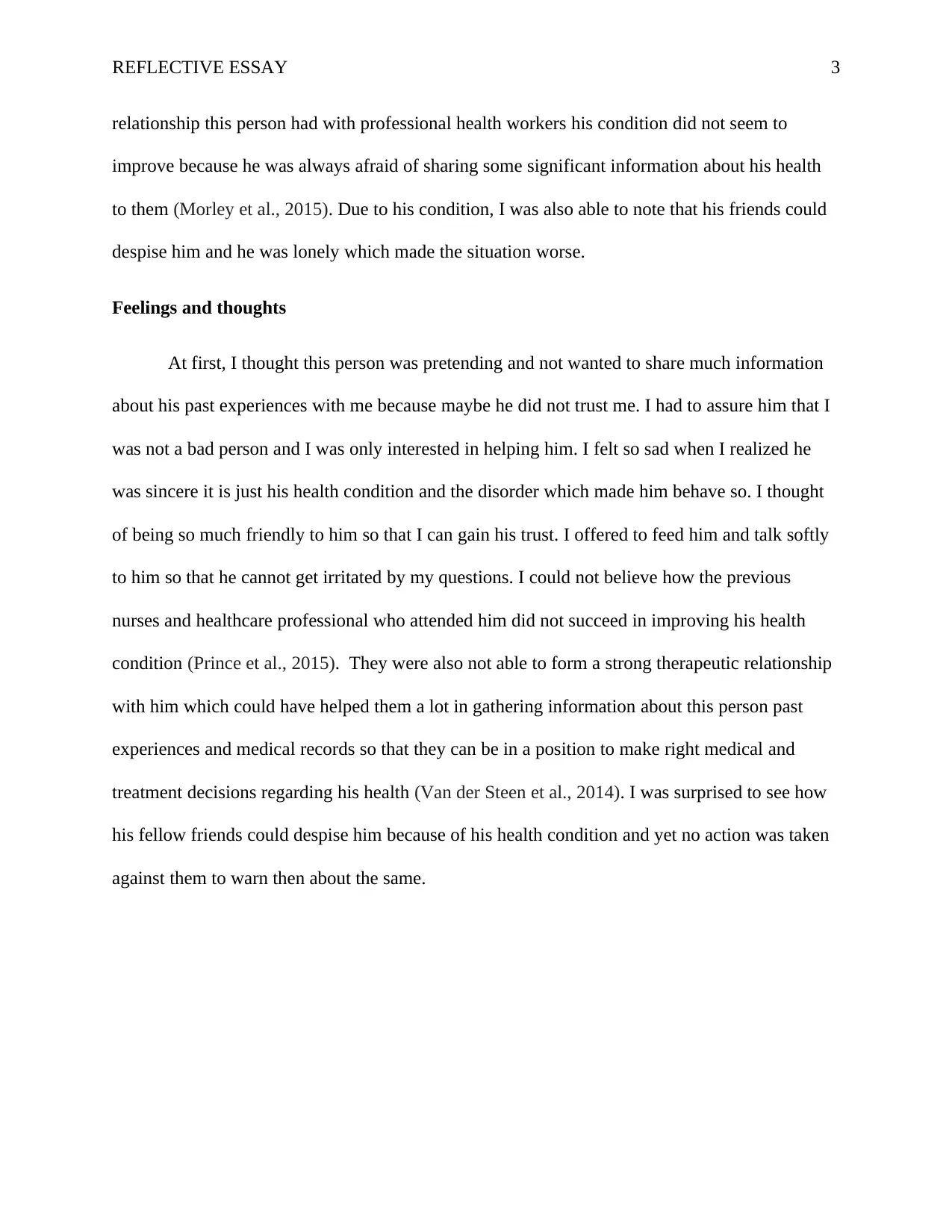
REFLECTIVE ESSAY 3
relationship this person had with professional health workers his condition did not seem to
improve because he was always afraid of sharing some significant information about his health
to them (Morley et al., 2015). Due to his condition, I was also able to note that his friends could
despise him and he was lonely which made the situation worse.
Feelings and thoughts
At first, I thought this person was pretending and not wanted to share much information
about his past experiences with me because maybe he did not trust me. I had to assure him that I
was not a bad person and I was only interested in helping him. I felt so sad when I realized he
was sincere it is just his health condition and the disorder which made him behave so. I thought
of being so much friendly to him so that I can gain his trust. I offered to feed him and talk softly
to him so that he cannot get irritated by my questions. I could not believe how the previous
nurses and healthcare professional who attended him did not succeed in improving his health
condition (Prince et al., 2015). They were also not able to form a strong therapeutic relationship
with him which could have helped them a lot in gathering information about this person past
experiences and medical records so that they can be in a position to make right medical and
treatment decisions regarding his health (Van der Steen et al., 2014). I was surprised to see how
his fellow friends could despise him because of his health condition and yet no action was taken
against them to warn then about the same.
relationship this person had with professional health workers his condition did not seem to
improve because he was always afraid of sharing some significant information about his health
to them (Morley et al., 2015). Due to his condition, I was also able to note that his friends could
despise him and he was lonely which made the situation worse.
Feelings and thoughts
At first, I thought this person was pretending and not wanted to share much information
about his past experiences with me because maybe he did not trust me. I had to assure him that I
was not a bad person and I was only interested in helping him. I felt so sad when I realized he
was sincere it is just his health condition and the disorder which made him behave so. I thought
of being so much friendly to him so that I can gain his trust. I offered to feed him and talk softly
to him so that he cannot get irritated by my questions. I could not believe how the previous
nurses and healthcare professional who attended him did not succeed in improving his health
condition (Prince et al., 2015). They were also not able to form a strong therapeutic relationship
with him which could have helped them a lot in gathering information about this person past
experiences and medical records so that they can be in a position to make right medical and
treatment decisions regarding his health (Van der Steen et al., 2014). I was surprised to see how
his fellow friends could despise him because of his health condition and yet no action was taken
against them to warn then about the same.
⊘ This is a preview!⊘
Do you want full access?
Subscribe today to unlock all pages.

Trusted by 1+ million students worldwide
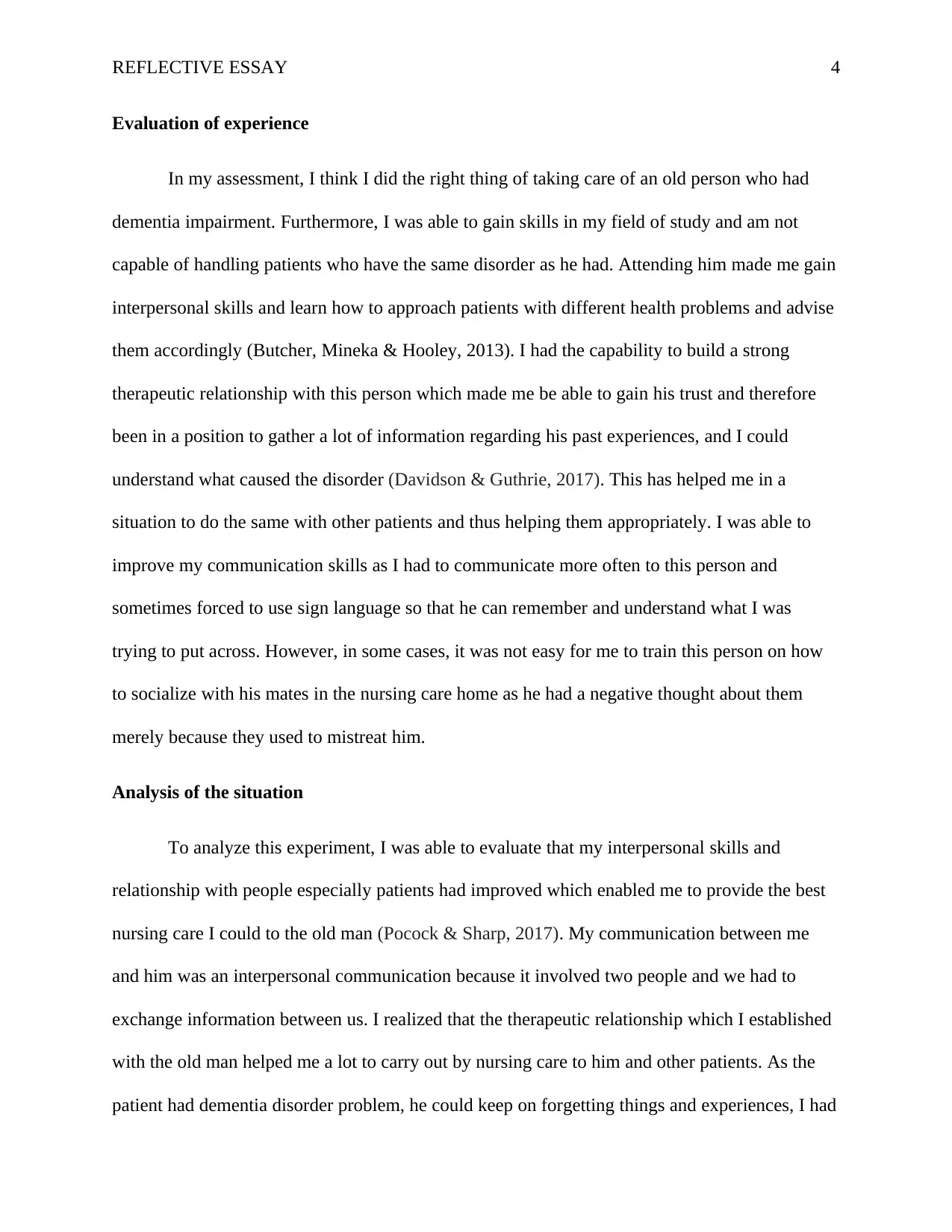
REFLECTIVE ESSAY 4
Evaluation of experience
In my assessment, I think I did the right thing of taking care of an old person who had
dementia impairment. Furthermore, I was able to gain skills in my field of study and am not
capable of handling patients who have the same disorder as he had. Attending him made me gain
interpersonal skills and learn how to approach patients with different health problems and advise
them accordingly (Butcher, Mineka & Hooley, 2013). I had the capability to build a strong
therapeutic relationship with this person which made me be able to gain his trust and therefore
been in a position to gather a lot of information regarding his past experiences, and I could
understand what caused the disorder (Davidson & Guthrie, 2017). This has helped me in a
situation to do the same with other patients and thus helping them appropriately. I was able to
improve my communication skills as I had to communicate more often to this person and
sometimes forced to use sign language so that he can remember and understand what I was
trying to put across. However, in some cases, it was not easy for me to train this person on how
to socialize with his mates in the nursing care home as he had a negative thought about them
merely because they used to mistreat him.
Analysis of the situation
To analyze this experiment, I was able to evaluate that my interpersonal skills and
relationship with people especially patients had improved which enabled me to provide the best
nursing care I could to the old man (Pocock & Sharp, 2017). My communication between me
and him was an interpersonal communication because it involved two people and we had to
exchange information between us. I realized that the therapeutic relationship which I established
with the old man helped me a lot to carry out by nursing care to him and other patients. As the
patient had dementia disorder problem, he could keep on forgetting things and experiences, I had
Evaluation of experience
In my assessment, I think I did the right thing of taking care of an old person who had
dementia impairment. Furthermore, I was able to gain skills in my field of study and am not
capable of handling patients who have the same disorder as he had. Attending him made me gain
interpersonal skills and learn how to approach patients with different health problems and advise
them accordingly (Butcher, Mineka & Hooley, 2013). I had the capability to build a strong
therapeutic relationship with this person which made me be able to gain his trust and therefore
been in a position to gather a lot of information regarding his past experiences, and I could
understand what caused the disorder (Davidson & Guthrie, 2017). This has helped me in a
situation to do the same with other patients and thus helping them appropriately. I was able to
improve my communication skills as I had to communicate more often to this person and
sometimes forced to use sign language so that he can remember and understand what I was
trying to put across. However, in some cases, it was not easy for me to train this person on how
to socialize with his mates in the nursing care home as he had a negative thought about them
merely because they used to mistreat him.
Analysis of the situation
To analyze this experiment, I was able to evaluate that my interpersonal skills and
relationship with people especially patients had improved which enabled me to provide the best
nursing care I could to the old man (Pocock & Sharp, 2017). My communication between me
and him was an interpersonal communication because it involved two people and we had to
exchange information between us. I realized that the therapeutic relationship which I established
with the old man helped me a lot to carry out by nursing care to him and other patients. As the
patient had dementia disorder problem, he could keep on forgetting things and experiences, I had
Paraphrase This Document
Need a fresh take? Get an instant paraphrase of this document with our AI Paraphraser
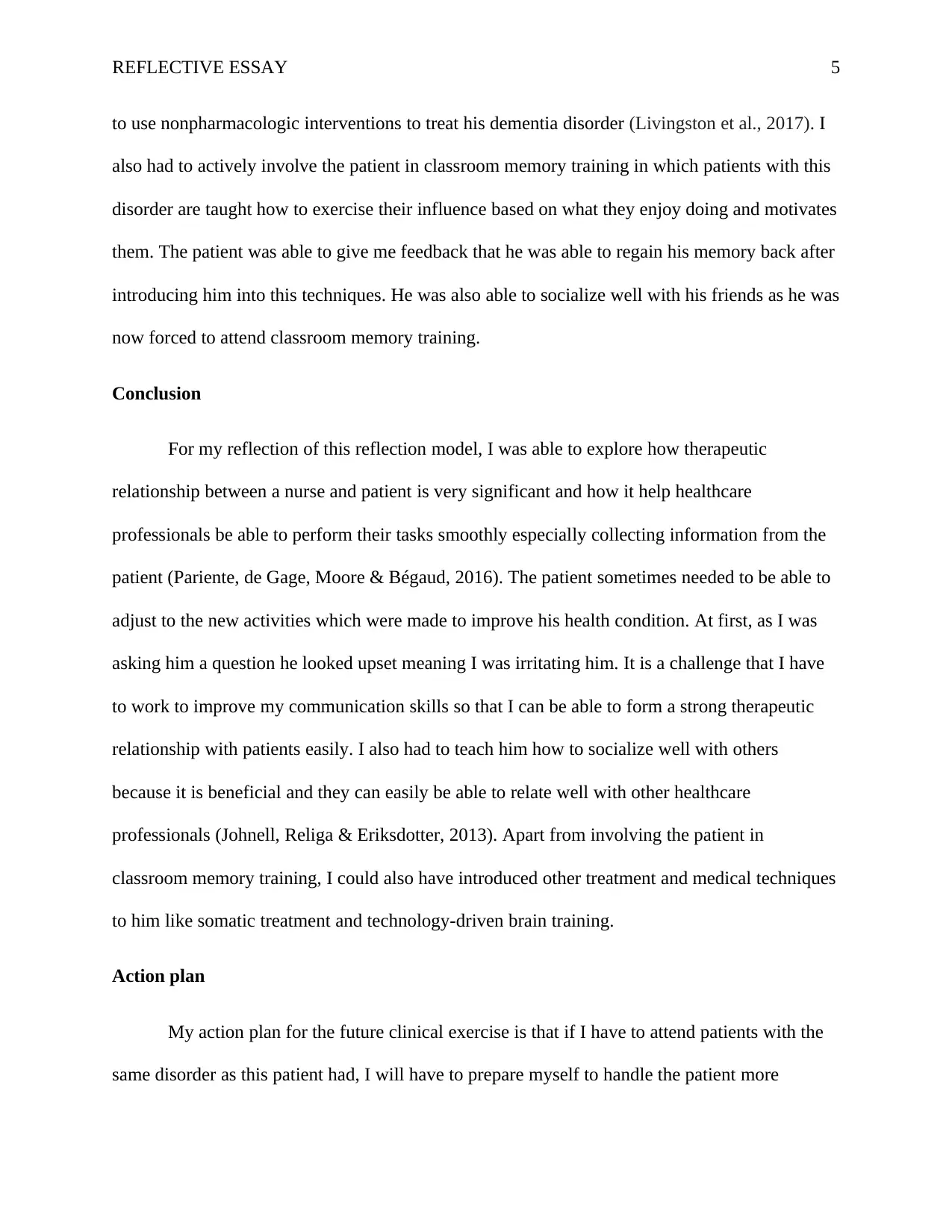
REFLECTIVE ESSAY 5
to use nonpharmacologic interventions to treat his dementia disorder (Livingston et al., 2017). I
also had to actively involve the patient in classroom memory training in which patients with this
disorder are taught how to exercise their influence based on what they enjoy doing and motivates
them. The patient was able to give me feedback that he was able to regain his memory back after
introducing him into this techniques. He was also able to socialize well with his friends as he was
now forced to attend classroom memory training.
Conclusion
For my reflection of this reflection model, I was able to explore how therapeutic
relationship between a nurse and patient is very significant and how it help healthcare
professionals be able to perform their tasks smoothly especially collecting information from the
patient (Pariente, de Gage, Moore & Bégaud, 2016). The patient sometimes needed to be able to
adjust to the new activities which were made to improve his health condition. At first, as I was
asking him a question he looked upset meaning I was irritating him. It is a challenge that I have
to work to improve my communication skills so that I can be able to form a strong therapeutic
relationship with patients easily. I also had to teach him how to socialize well with others
because it is beneficial and they can easily be able to relate well with other healthcare
professionals (Johnell, Religa & Eriksdotter, 2013). Apart from involving the patient in
classroom memory training, I could also have introduced other treatment and medical techniques
to him like somatic treatment and technology-driven brain training.
Action plan
My action plan for the future clinical exercise is that if I have to attend patients with the
same disorder as this patient had, I will have to prepare myself to handle the patient more
to use nonpharmacologic interventions to treat his dementia disorder (Livingston et al., 2017). I
also had to actively involve the patient in classroom memory training in which patients with this
disorder are taught how to exercise their influence based on what they enjoy doing and motivates
them. The patient was able to give me feedback that he was able to regain his memory back after
introducing him into this techniques. He was also able to socialize well with his friends as he was
now forced to attend classroom memory training.
Conclusion
For my reflection of this reflection model, I was able to explore how therapeutic
relationship between a nurse and patient is very significant and how it help healthcare
professionals be able to perform their tasks smoothly especially collecting information from the
patient (Pariente, de Gage, Moore & Bégaud, 2016). The patient sometimes needed to be able to
adjust to the new activities which were made to improve his health condition. At first, as I was
asking him a question he looked upset meaning I was irritating him. It is a challenge that I have
to work to improve my communication skills so that I can be able to form a strong therapeutic
relationship with patients easily. I also had to teach him how to socialize well with others
because it is beneficial and they can easily be able to relate well with other healthcare
professionals (Johnell, Religa & Eriksdotter, 2013). Apart from involving the patient in
classroom memory training, I could also have introduced other treatment and medical techniques
to him like somatic treatment and technology-driven brain training.
Action plan
My action plan for the future clinical exercise is that if I have to attend patients with the
same disorder as this patient had, I will have to prepare myself to handle the patient more
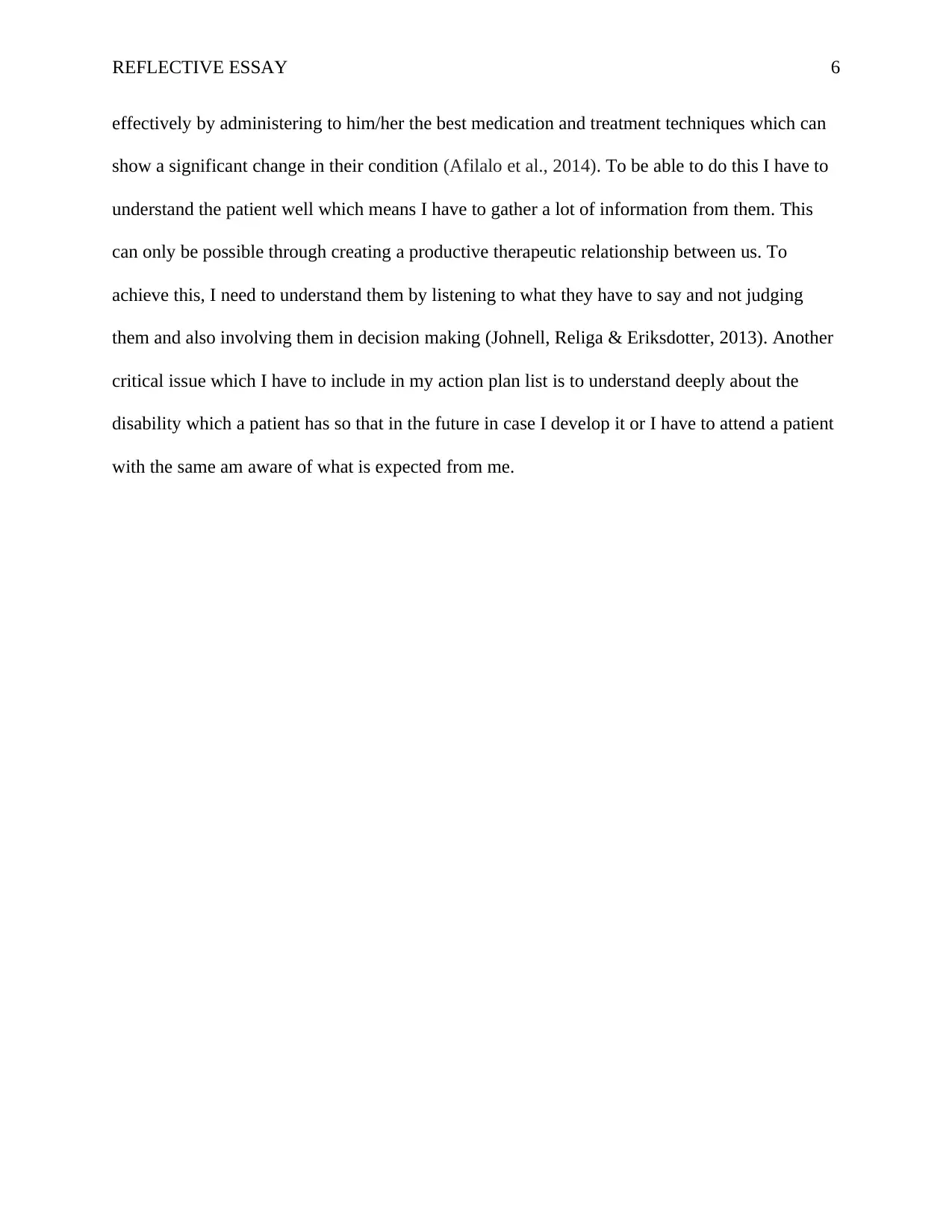
REFLECTIVE ESSAY 6
effectively by administering to him/her the best medication and treatment techniques which can
show a significant change in their condition (Afilalo et al., 2014). To be able to do this I have to
understand the patient well which means I have to gather a lot of information from them. This
can only be possible through creating a productive therapeutic relationship between us. To
achieve this, I need to understand them by listening to what they have to say and not judging
them and also involving them in decision making (Johnell, Religa & Eriksdotter, 2013). Another
critical issue which I have to include in my action plan list is to understand deeply about the
disability which a patient has so that in the future in case I develop it or I have to attend a patient
with the same am aware of what is expected from me.
effectively by administering to him/her the best medication and treatment techniques which can
show a significant change in their condition (Afilalo et al., 2014). To be able to do this I have to
understand the patient well which means I have to gather a lot of information from them. This
can only be possible through creating a productive therapeutic relationship between us. To
achieve this, I need to understand them by listening to what they have to say and not judging
them and also involving them in decision making (Johnell, Religa & Eriksdotter, 2013). Another
critical issue which I have to include in my action plan list is to understand deeply about the
disability which a patient has so that in the future in case I develop it or I have to attend a patient
with the same am aware of what is expected from me.
⊘ This is a preview!⊘
Do you want full access?
Subscribe today to unlock all pages.

Trusted by 1+ million students worldwide
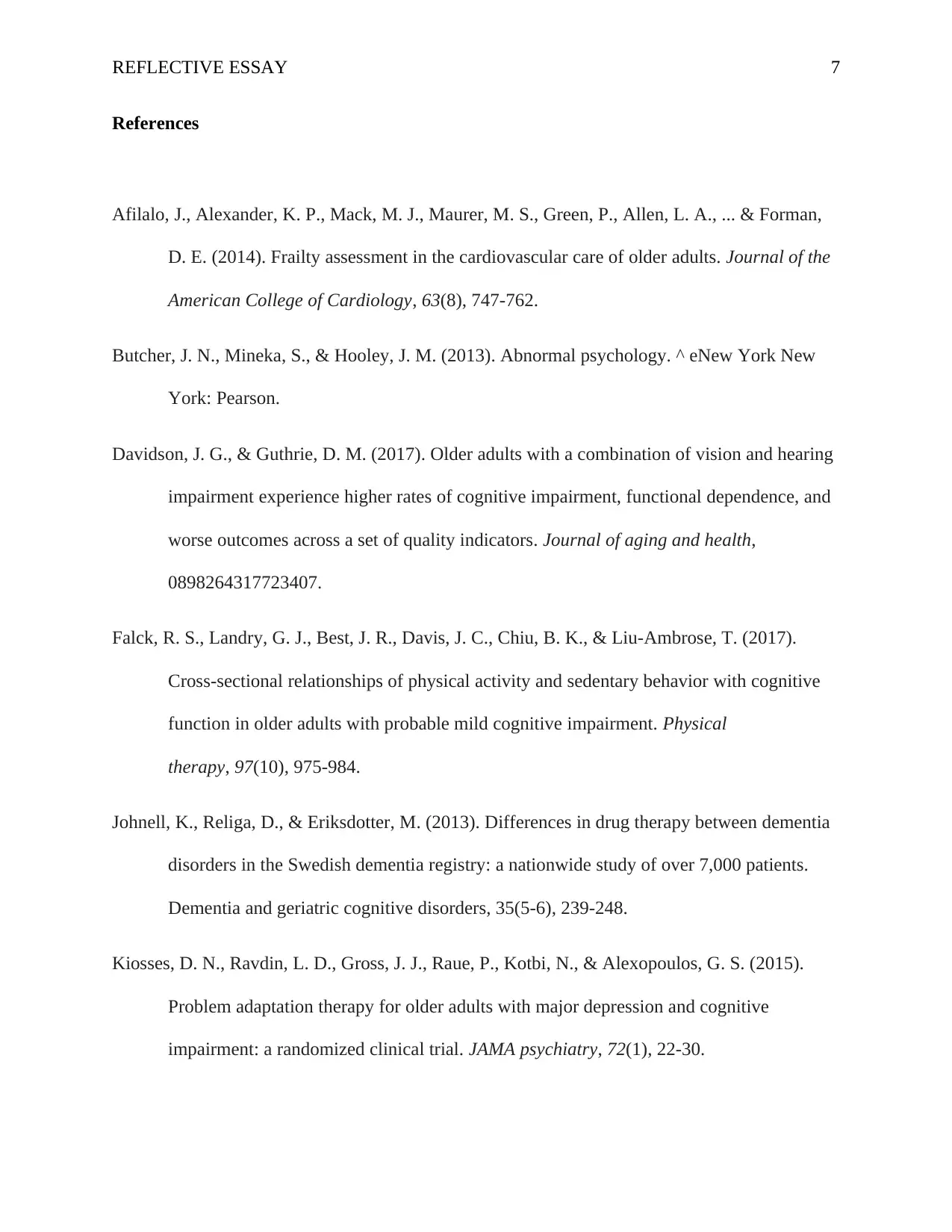
REFLECTIVE ESSAY 7
References
Afilalo, J., Alexander, K. P., Mack, M. J., Maurer, M. S., Green, P., Allen, L. A., ... & Forman,
D. E. (2014). Frailty assessment in the cardiovascular care of older adults. Journal of the
American College of Cardiology, 63(8), 747-762.
Butcher, J. N., Mineka, S., & Hooley, J. M. (2013). Abnormal psychology. ^ eNew York New
York: Pearson.
Davidson, J. G., & Guthrie, D. M. (2017). Older adults with a combination of vision and hearing
impairment experience higher rates of cognitive impairment, functional dependence, and
worse outcomes across a set of quality indicators. Journal of aging and health,
0898264317723407.
Falck, R. S., Landry, G. J., Best, J. R., Davis, J. C., Chiu, B. K., & Liu-Ambrose, T. (2017).
Cross-sectional relationships of physical activity and sedentary behavior with cognitive
function in older adults with probable mild cognitive impairment. Physical
therapy, 97(10), 975-984.
Johnell, K., Religa, D., & Eriksdotter, M. (2013). Differences in drug therapy between dementia
disorders in the Swedish dementia registry: a nationwide study of over 7,000 patients.
Dementia and geriatric cognitive disorders, 35(5-6), 239-248.
Kiosses, D. N., Ravdin, L. D., Gross, J. J., Raue, P., Kotbi, N., & Alexopoulos, G. S. (2015).
Problem adaptation therapy for older adults with major depression and cognitive
impairment: a randomized clinical trial. JAMA psychiatry, 72(1), 22-30.
References
Afilalo, J., Alexander, K. P., Mack, M. J., Maurer, M. S., Green, P., Allen, L. A., ... & Forman,
D. E. (2014). Frailty assessment in the cardiovascular care of older adults. Journal of the
American College of Cardiology, 63(8), 747-762.
Butcher, J. N., Mineka, S., & Hooley, J. M. (2013). Abnormal psychology. ^ eNew York New
York: Pearson.
Davidson, J. G., & Guthrie, D. M. (2017). Older adults with a combination of vision and hearing
impairment experience higher rates of cognitive impairment, functional dependence, and
worse outcomes across a set of quality indicators. Journal of aging and health,
0898264317723407.
Falck, R. S., Landry, G. J., Best, J. R., Davis, J. C., Chiu, B. K., & Liu-Ambrose, T. (2017).
Cross-sectional relationships of physical activity and sedentary behavior with cognitive
function in older adults with probable mild cognitive impairment. Physical
therapy, 97(10), 975-984.
Johnell, K., Religa, D., & Eriksdotter, M. (2013). Differences in drug therapy between dementia
disorders in the Swedish dementia registry: a nationwide study of over 7,000 patients.
Dementia and geriatric cognitive disorders, 35(5-6), 239-248.
Kiosses, D. N., Ravdin, L. D., Gross, J. J., Raue, P., Kotbi, N., & Alexopoulos, G. S. (2015).
Problem adaptation therapy for older adults with major depression and cognitive
impairment: a randomized clinical trial. JAMA psychiatry, 72(1), 22-30.
Paraphrase This Document
Need a fresh take? Get an instant paraphrase of this document with our AI Paraphraser
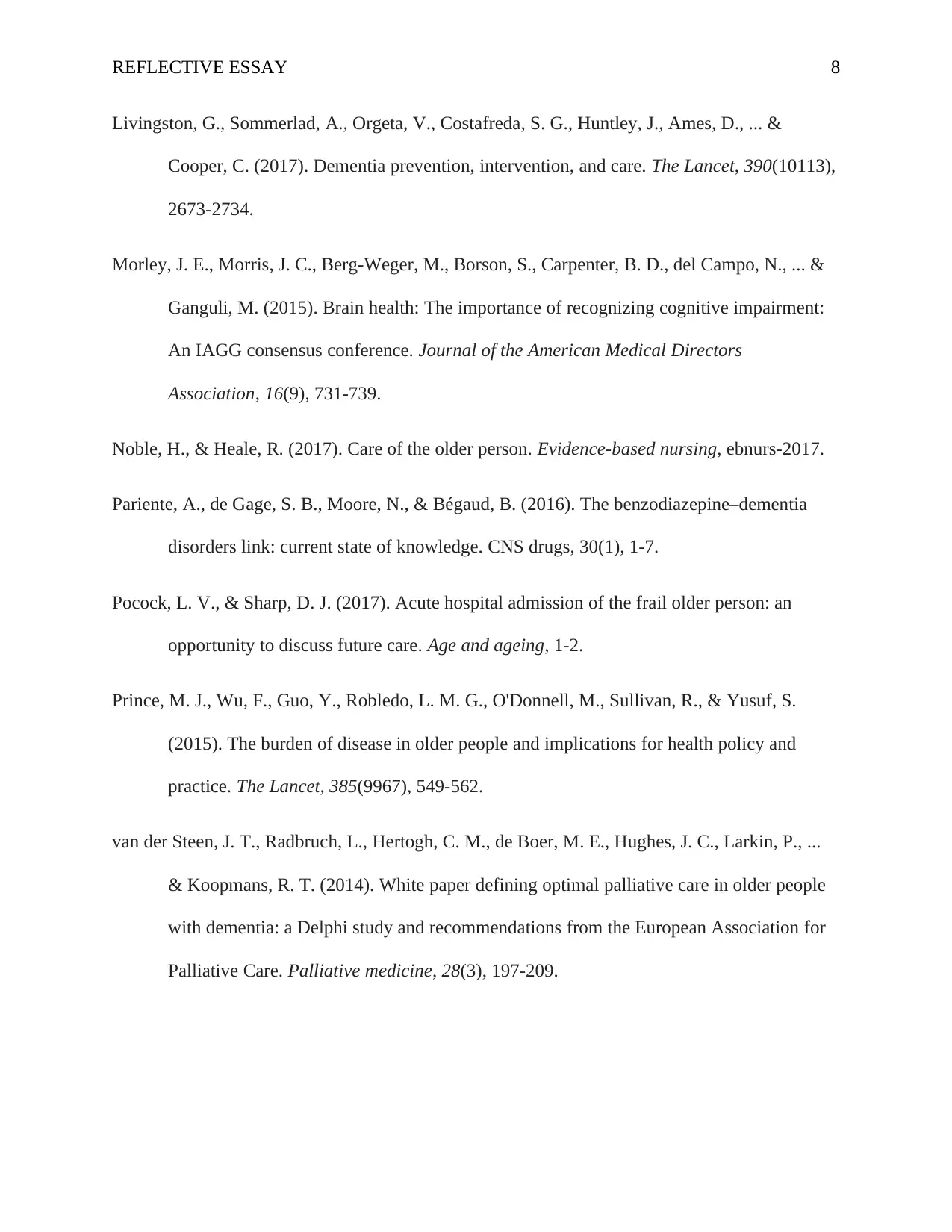
REFLECTIVE ESSAY 8
Livingston, G., Sommerlad, A., Orgeta, V., Costafreda, S. G., Huntley, J., Ames, D., ... &
Cooper, C. (2017). Dementia prevention, intervention, and care. The Lancet, 390(10113),
2673-2734.
Morley, J. E., Morris, J. C., Berg-Weger, M., Borson, S., Carpenter, B. D., del Campo, N., ... &
Ganguli, M. (2015). Brain health: The importance of recognizing cognitive impairment:
An IAGG consensus conference. Journal of the American Medical Directors
Association, 16(9), 731-739.
Noble, H., & Heale, R. (2017). Care of the older person. Evidence-based nursing, ebnurs-2017.
Pariente, A., de Gage, S. B., Moore, N., & Bégaud, B. (2016). The benzodiazepine–dementia
disorders link: current state of knowledge. CNS drugs, 30(1), 1-7.
Pocock, L. V., & Sharp, D. J. (2017). Acute hospital admission of the frail older person: an
opportunity to discuss future care. Age and ageing, 1-2.
Prince, M. J., Wu, F., Guo, Y., Robledo, L. M. G., O'Donnell, M., Sullivan, R., & Yusuf, S.
(2015). The burden of disease in older people and implications for health policy and
practice. The Lancet, 385(9967), 549-562.
van der Steen, J. T., Radbruch, L., Hertogh, C. M., de Boer, M. E., Hughes, J. C., Larkin, P., ...
& Koopmans, R. T. (2014). White paper defining optimal palliative care in older people
with dementia: a Delphi study and recommendations from the European Association for
Palliative Care. Palliative medicine, 28(3), 197-209.
Livingston, G., Sommerlad, A., Orgeta, V., Costafreda, S. G., Huntley, J., Ames, D., ... &
Cooper, C. (2017). Dementia prevention, intervention, and care. The Lancet, 390(10113),
2673-2734.
Morley, J. E., Morris, J. C., Berg-Weger, M., Borson, S., Carpenter, B. D., del Campo, N., ... &
Ganguli, M. (2015). Brain health: The importance of recognizing cognitive impairment:
An IAGG consensus conference. Journal of the American Medical Directors
Association, 16(9), 731-739.
Noble, H., & Heale, R. (2017). Care of the older person. Evidence-based nursing, ebnurs-2017.
Pariente, A., de Gage, S. B., Moore, N., & Bégaud, B. (2016). The benzodiazepine–dementia
disorders link: current state of knowledge. CNS drugs, 30(1), 1-7.
Pocock, L. V., & Sharp, D. J. (2017). Acute hospital admission of the frail older person: an
opportunity to discuss future care. Age and ageing, 1-2.
Prince, M. J., Wu, F., Guo, Y., Robledo, L. M. G., O'Donnell, M., Sullivan, R., & Yusuf, S.
(2015). The burden of disease in older people and implications for health policy and
practice. The Lancet, 385(9967), 549-562.
van der Steen, J. T., Radbruch, L., Hertogh, C. M., de Boer, M. E., Hughes, J. C., Larkin, P., ...
& Koopmans, R. T. (2014). White paper defining optimal palliative care in older people
with dementia: a Delphi study and recommendations from the European Association for
Palliative Care. Palliative medicine, 28(3), 197-209.
1 out of 8
Related Documents
Your All-in-One AI-Powered Toolkit for Academic Success.
+13062052269
info@desklib.com
Available 24*7 on WhatsApp / Email
![[object Object]](/_next/static/media/star-bottom.7253800d.svg)
Unlock your academic potential
Copyright © 2020–2026 A2Z Services. All Rights Reserved. Developed and managed by ZUCOL.





